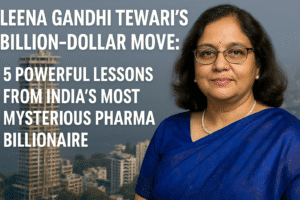Leena Gandhi Tewari’s Billion-Dollar Move: 5 Powerful Lessons from India’s Most Mysterious Pharma Billionaire
Leena Gandhi Tewari, chairperson of Mumbai-based pharmaceutical giant USV, recently made headlines by purchasing India’s costliest residential property: two sea-facing Worli duplexes for ₹639 crore. Beyond this record transaction, her significance lies in embodying a powerful but discreet approach to wealth and leadership. While her $3.9 billion net worth places her among India’s richest women, Tewari avoids the spotlight, focusing instead on stewarding USV – founded by her father – which produces trusted, everyday medicines like Glycomet and Ecosprin impacting millions.
Her generational strategy is evident in appointing her MIT-educated daughter to the board, emphasizing merit. The ultra-luxury apartment purchase reflects not mere extravagance, but a calculated move for enduring assets and privacy. Ultimately, Tewari represents a potent blend of legacy business impact, strategic generational planning, and a quiet redefinition of influence that prioritizes substance over celebrity in India’s evolving economic landscape.

Leena Gandhi Tewari’s Billion-Dollar Move: 5 Powerful Lessons from India’s Most Mysterious Pharma Billionaire
When Leena Gandhi Tewari quietly acquired two sea-facing duplexes in Mumbai’s Naman Xana tower for ₹639 crore (₹703 crore with taxes), she didn’t just break real estate records—she shattered the stereotype of how India’s ultra-wealthy operate. In a landscape dominated by flamboyant industrialists and viral billionaire lifestyles, Tewari’s story is a masterclass in understated influence.
The Anatomy of a Record Deal
At ₹2.83 lakh/sq. ft., the Worli purchase seems astronomical. Yet context transforms it from extravagance to strategic investment:
- Location as Legacy: Sea-facing penthouses in South Mumbai’s limited inventory appreciate like rare art. For generational wealth, this isn’t indulgence—it’s capital preservation.
- The Privacy Premium: Floors 32-35 offer seclusion inaccessible elsewhere. For discreet figures like Tewari, this justifies the cost.
- Tax Transparency: Her immediate payment of ₹63.9 crore in duties reflects a calculated approach, avoiding legal ambiguities plaguing high-value transactions.
USV: The Unseen Pharma Giant
While her apartment made headlines, Tewari’s real legacy lies in chairing USV—a company whose products touch millions of Indians daily, yet whose leadership remains largely unrecognized. This duality is telling:
- Everyday Impact: Glycomet (diabetes) and Ecosprin (cardiac care) dominate market shelves. USV’s quiet dominance in chronic disease management fuels India’s public health.
- Generational Bridge: Founded by her father Vithal Gandhi with Revlon in 1961, USV now blends tradition (her husband Prashant’s engineering rigor) with next-gen vision (daughter Aneesha’s MIT molecular biology expertise).
- The “Anti-Glamour” Pharma Play: Unlike flashier sectors, USV’s $3.9 billion valuation underscores how unglamorous essentials—generic medicines—build enduring wealth.
The Power of Anonymity
Tewari’s near-invisibility despite her Forbes ranking reveals a deliberate philosophy:
- Network Over Notoriety: Her closeness to Nita Ambani hints at influential circles operating beyond public gaze.
- Meritocracy as Heritage: Appointing daughter Aneesha to USV’s board only after a MIT Ph.D. signals rigor over entitlement.
- Asset vs. Identity: The apartment purchase wasn’t a status announcement—it was a private transaction that leaked. Her life remains compartmentalized: business stewardship separate from personal spending.
Why This Matters Beyond Real Estate
Tewari’s narrative reflects broader shifts in Indian wealth:
- Women’s Uncelebrated Leadership: She joins Kiran Mazumdar-Shaw and Falguni Nayar in proving female billionaires need no cult of personality to drive empires.
- The New Discretion: As scrutiny intensifies, the ultra-rich are opting for “stealth wealth”—investing in non-liquid assets (real estate, art) while avoiding lifestyle branding.
- Pharma’s Quiet Revolution: While tech unicorns grab attention, generics giants like USV build moats through deep distribution and trust—a lesson in substance over hype.
The Takeaway
Leena Gandhi Tewari’s story isn’t about luxury flats—it’s about redefining influence. In an era of performative affluence, she demonstrates how legacy is built through patient capital, silent impact, and an unwavering focus on institutions over individuals. Her ₹639 crore apartments are less a trophy and more a metaphor: a vantage point chosen for perspective, not prestige. As India’s economy matures, her model of leadership—visible only through its outcomes—may prove the most sustainable.
You must be logged in to post a comment.